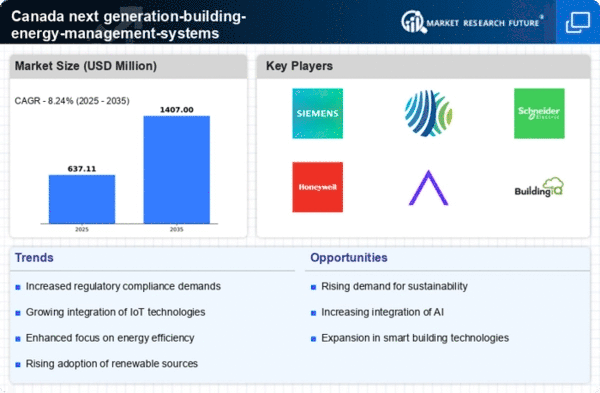Rising Energy Costs
The escalating costs of energy in Canada are driving the demand for next generation-building-energy-management-systems market. As energy prices continue to rise, businesses and homeowners are increasingly seeking solutions that can optimize energy consumption and reduce expenses. The implementation of advanced energy management systems can lead to savings of up to 30% on energy bills, making them an attractive investment. This trend is particularly pronounced in urban areas where energy costs are significantly higher. The next generation-building-energy-management-systems market is thus positioned to benefit from this economic pressure, as stakeholders look for innovative ways to manage their energy use more effectively.
Increased Focus on Sustainability
The growing emphasis on sustainability among Canadian consumers and businesses is a key driver for the next generation-building-energy-management-systems market. As environmental awareness rises, there is a notable shift towards adopting energy management solutions that minimize carbon footprints. Reports indicate that 70% of Canadian companies are prioritizing sustainability in their operations, which directly correlates with the demand for advanced energy management systems. This trend is likely to continue, as organizations recognize the importance of aligning their practices with environmental goals, thereby propelling the market forward.
Technological Advancements in IoT
The rapid advancements in Internet of Things (IoT) technology are reshaping the next generation-building-energy-management-systems market. IoT devices enable real-time monitoring and control of energy consumption, allowing for more precise management of energy resources. In Canada, the integration of IoT in energy management systems is projected to grow by 25% annually, as businesses seek to leverage data analytics for improved efficiency. This technological evolution not only enhances operational efficiency but also supports sustainability goals, making it a critical driver for the market's growth.
Government Incentives for Energy Efficiency
Canadian government initiatives aimed at promoting energy efficiency are significantly influencing the next generation-building-energy-management-systems market. Programs that offer financial incentives, such as rebates and tax credits, encourage the adoption of energy-efficient technologies. For instance, the Canadian government has allocated over $1 billion to support energy efficiency projects, which directly impacts the market by making advanced energy management systems more accessible. These incentives not only help reduce the initial investment costs but also enhance the long-term return on investment for users, thereby fostering a more robust market environment.
Urbanization and Infrastructure Development
The ongoing urbanization in Canada is significantly impacting the next generation-building-energy-management-systems market. As cities expand, the demand for efficient energy management solutions becomes increasingly critical to support the growing infrastructure. Urban areas are projected to see a population increase of 15% by 2030, leading to higher energy consumption. Consequently, the need for advanced energy management systems that can handle this increased demand while promoting efficiency is paramount. This urban growth presents a substantial opportunity for the market, as stakeholders seek to implement innovative solutions to manage energy resources effectively.
















